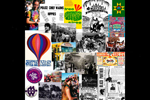| Over the past twenty years of putting this website together, it's
been an interesting experience dealing with the public who access these
pages. Occasionally someone writes an email letting me know how they've
used the online Digger Archives here. Recently, I came across a history
of the Communication Company by Evan Edwin Carlson written for his
librarian's master's thesis at San Jose State University last year
(2012). I read through his history, which is very well written, very
level headed, and noticed that he had attributed many of his sources to
the Digger Archives. I asked and Evan gave permission to publish his
research, which is now posted
under the History section. And then, a
more recent inquiry came in from the
Feedback Form, requesting a scan of the
"Digger Dollar" for this individual who has an
interest in counterculture history. Now this was an unusual request, but
again all communication that comes from public viewers is unusual. There
has not been a lot. So I promised to scan the "Digger Dollar" for this
person.
I'm not sure why I never scanned and posted the Digger Dollar. I
guess because it never seemed as significant as so much else in the
collection. What exists here online is only five
or ten percent of the collection. There are many significant pieces that make up the Digger
Archives which deserve to be accessible but are not (yet).
But, then—a copy of a Digger Dollar came up for sale on a dealer's
site. The owner was asking $300 and explained why that was such a deal,
because there had been a recent copy sold for $600. The synchronicity of
these two events was enough reason to open a new page and allow me to
disclaim the bane of commercial success for a counterculture archivist.
When this site first opened in 1993, it was intended to be an
inspiration for local community activists who may not have heard about
the Digger Movement of the Sixties and its relevance to organizing
today. When the Occupy Wall Street movement manifested itself briefly in
Zucotti Park in 2011, the form of the encampment in that brief urban
experiment resembled the vision of the Diggers in their Free City
manifestos. There in the middle of the Wall Street confluence was a free
store, a free kitchen, free library, and multiple collectives organizing
all the work to
maintain and sustain the community. Just as had been envisioned in the
article
Post-Competitive, Comparative Game of Free City, part of the
Diggers' last publication
from 1968.
The intent was also to preserve the history that many of us who were
involved in the Diggers and the Digger Movement had experienced. The
documents here represent what we devoted our youth to trying to build.
Some will call it blasphemy but I believe there should be a Vietnam
Memorial for those who fought AGAINST the Vietnam War. Many people made
decisions to oppose government policy, many marched in the streets, some
dropped out of the given lifepaths they had inherited and tried to
create something anew. In the Sixties many people in
America and around the world chose new paths to resist the dominant
society. The Diggers are an
important voice in that counterculture. With all due respect to the
historians who will come afterwards, the most important thing incumbent
on me was to preserve this incredibly rich documentary history of that
time.
It came as a shock the first time I found someone selling Digger
items online. The Digger philosophy was always Free. One of the early
Diggers once suggested that the Digger Archives print up a batch of tye-dye
"1% Free" t-shirts and sell them. The suggestion was made in complete
jest. Anyone who knew the Diggers would realize how ludicrous the idea
is of selling Digger artifacts. Now it has become commonplace to find
vendors selling Com/Co street sheets or Free City news sheets and who
copy and paste the Overview
section here to use as their item description. It is so commonplace
that it hardly is noticed anymore.
But when a Digger Dollar gets sold for $300, that gets my attention.
Just as the online website represents only a small portion
of the archive, so the actual collection is not nearly complete. I am
continually finding new Communication Company street sheets. I just
finished putting up the
virtual archive of the Chester Anderson Papers at the Bancroft
Library. Chester always told me he thought they had printed 900 items in
those eight months of 1967. Yet, the total number of Com/Co sheets in
his collection at the Bancroft collection is around 400 sheets. I have collected and
cataloged around 400, many of which are not in the Anderson Papers.
Clearly, we still have our work cut out putting together the definitive
set of Communication Company street sheets. And that doesn't even get to the collections of
Digger sheets, Free City news, Planetedge materials, Free Communes, etc.
Lest this diatribe start sounding like a pity party, just let me
make a plea to the reader. To all those who may have Digger materials: if
you find at some point that you would like to unburden yourself of your
paper treasure, consider donating it to the Digger Archives. Eventually
this collection will be completely accessible online in various formats.
And it will find a home in some library that is copacetic with the
history of this movement. But in the meantime, I sure as hell can't
afford $300 for a Digger Dollar. Let's hope that the demand for these
materials slackens. And hope that this site isn't helping propel the
paradox of collector demand which is anathema to archivists everywhere.
—Ed.
|

